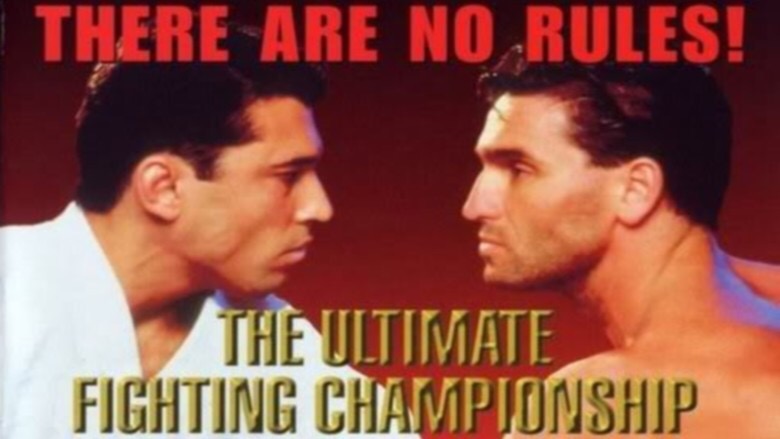It's another week, which means another blog post for my "Marketing in Fitness" series.
Recently, I've become a fan of mixed martial arts and combat sports. In particular, the Ultimate Fighting Championship (UFC). I've ordered a few pay-per-views over the past few months and have found myself absolutely enthralled by the characters, variety in styles, and aesthetic of the event. Seeing two people who have dedicated their lives to turning their bodies into weapons going at one another for bragging rights while forging their legacy and mark in history is something I'm definitely into now.
| Source: http://www.beyondhe.com.au/media/media/cache/594x334/SH0248_UFC_main.jpg |
I know that sports don't really enter the realm of fitness in the sense that it's not 100% about working out at the gym, but I still feel that sports are absolutely relevant to fitness, since we are dealing with world-class athletes who work endlessly in gyms to perfect their craft and be at their most optimal fitness level.
Recently, the UFC was legalized in New York. To be completely honest with you, I had no clue that it wasn't legal there but after thinking about it realized that there's never been a recent UFC event at Madison Square Garden or other New York venues despite them being among some of the most premiere locations in the world.
I was scrolling through articles for inspiration on what topic to discuss for this week, when I found an article on Yahoo! (link at the bottom) talking about the early years of the UFC and how their startup marketing strategy led to their negative stigma and eventual banning in the Empire State.
The UFC was launched in 1993 by four men, one of which was Campbell McLaren. Mclaren had an idea for marketing the UFC, which for the time would in my opinion be somewhat nontraditional. The UFC didn't have a fanbase that was passed down from generation to generation like a lot of other sports, and chose not to sell their product based on their athletes, most likely due to the fact that they were not as well known as the athletes in more popular sports. So, the UFC decided to use its unique and intense looking style of violence as a way to market their product. They made it look and feel like some underground event was taking place where anything could happen, where rules and restrictions were minimal.
| Campbell McLaren with Fighter Source: http://i3.dailyrecord.co.uk/incoming/article3435421.ece/ALTERNATES/s615/Campbell-McLaren-with-Emmanuel-Yarbrough.jpg |
The UFC at that time even went so far as to say a fighter could lose by one of three ways: submission, knockout, or death. It marketed itself as the most intense sports could possibly get, and that you would see the ultimate in competition where anything could happen.
This campaign was very successful for the UFC. They sold many pay-per views and were doing well as a startup company. But it was a double-edged sword. The same no-holds barred, anything goes marketing campaign showcasing how intense the sport was also created a stigma with many traditional sports fans and led to the UFC being banned at certain locations. Personnel involved with the UFC had to also appear in court on a regular basis to defend their product.
 |
| Source: https://youmayormaynotknow.files.wordpress.com/2015/11/img_4942.jpg |
This article made me think of different ways to market a product. While risky, perhaps some companies could benefit off of marketing their product as taboo and rare. The early UFC wanted to market their product as edgy and controversial, and I think it paid off for them in developing a niche fanbase to launch from. I believe that showing how your product goes against the establishment resonates with a lot of consumers today as well. I would be interested in seeing other companies take the risk the UFC did in their early years and see if "exclusive edgy" marketing pays off as a viable way to develop loyal niche consumers to launch your brand from. I also believe that having a little bit of controversy along with the product gets people talking about it more, giving the company free publicity.
Today, with better rules and regulations, the UFC has become a lot more organized and accepted at many places like New York. It may be hard to say, but the question arises as to whether or not the UFC could have become the multi-billion dollar company it is today without first establishing itself the way that it did with their unique marketing campaign to build an audience from. .
-Jtrain
-----------------------------------------------------------------------------------------------------------------------------------*Have a question about natural bodybuilding / fitness / nutrition / stress?
Need some advice? Email me at jtrainfitness@gmail.com and I will answer
it on this blog! Be sure to enter your email to receive alerts for
when the next blog post has come out, and be sure to tell your
friends about this blog! Follow me on Instagram @jtrain1224 and tell
your friends to do the same!*
------------------------------------------------------------------------------------------------------------------------------------
No comments:
Post a Comment